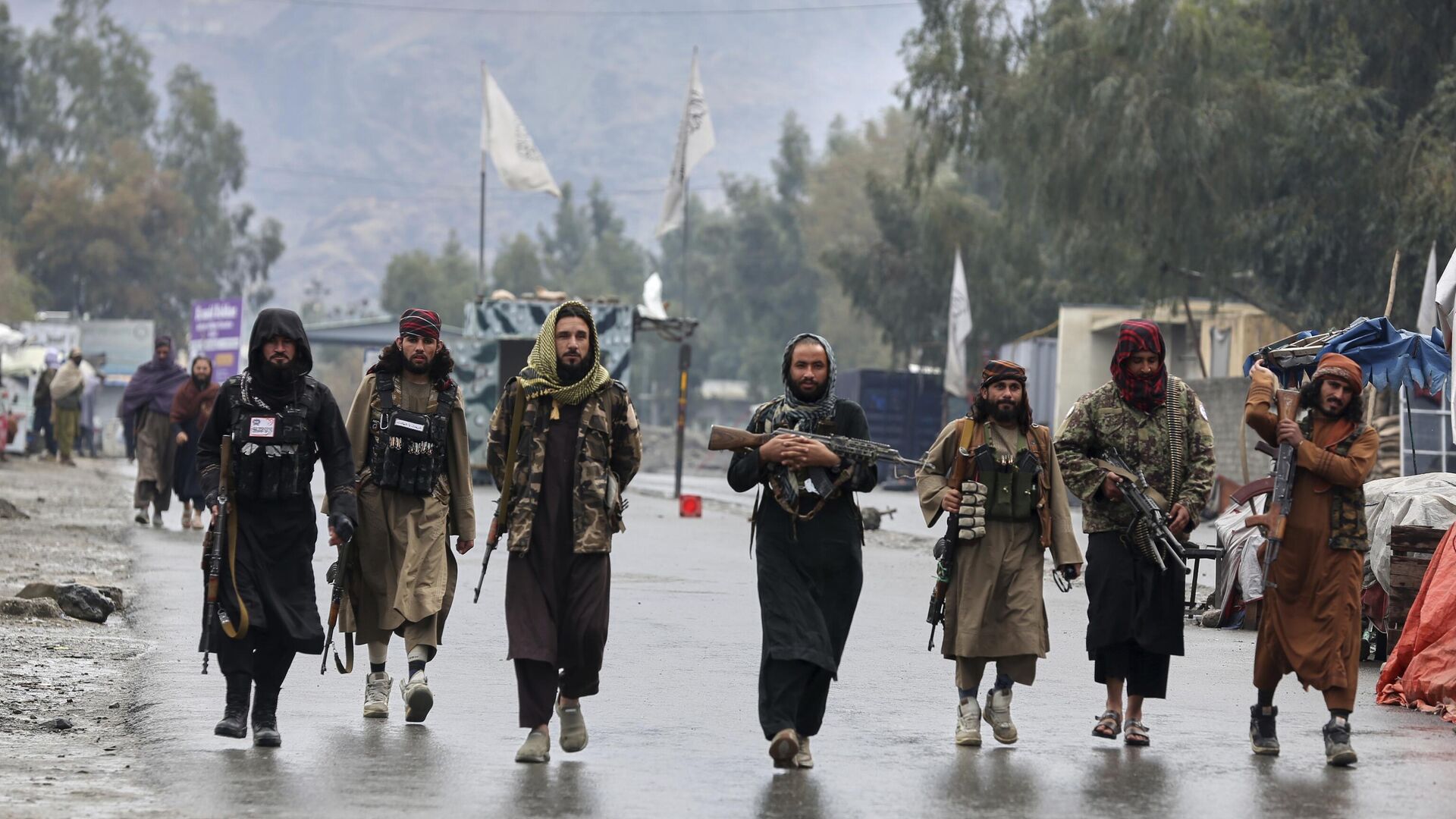https://sputniknews.in/20251014/afghanistan-pakistan-clashes-and-implications-for-india-9915035.html
Afghanistan-Pakistan Clashes and Implications for India
Afghanistan-Pakistan Clashes and Implications for India
Sputnik India
Deadly clashes erupted last week between Afghan and Pakistani forces, resulting in casualties on both sides and mutual warnings against violating territorial... 14.10.2025, Sputnik India
2025-10-14T18:14+0530
2025-10-14T18:14+0530
2025-10-29T19:41+0530
sputnik opinion
pakistan
india
afghanistan
taliban
tehreek-e-taliban pakistan (ttp)
inter-services intelligence (isi)
ministry of external affairs (mea)
delhi
new delhi
https://cdn1.img.sputniknews.in/img/07e9/0a/0c/9911808_0:160:3072:1888_1920x0_80_0_0_629a130ca15966f47ea00180a034fa39.jpg
Afghanistan's foreign minister's public criticism of Pakistan has implications for regional dynamics. Experts suggest that these developments may influence diplomatic and strategic alignments in the region.India has already upgraded its diplomatic mission in Kabul to a full embassy during Afghan FM Amir Khan Muttaqi’s visit, signaling deeper engagement. The week-long stay indicates Kabul is ‘warming to Delhi’ as its relations with Islamabad face challenges, Mishra noted. By visiting India amid the clashes and including 'Jammu & Kashmir, India' in a joint statement, the Taliban sent a strong message emphasizing their autonomy and tactical alignment rather than formal alliance with India.From India’s perspective, reopening the embassy and hosting Muttaqi during heightened tensions holds strategic significance, as it signals India’s support for Afghanistan’s sovereignty and serves as a counterbalance in the region, the expert believes.However, Pakistan controls many traditional land routes for trade and transit, including goods and aid. This underscores the importance for India and the Taliban to explore alternative corridors, such as via Iran’s Chabahar port and Central Asia, to reduce Pakistan’s gatekeeper role in regional connectivity, he stated.The Taliban leadership has expressed concerns over Pakistan’s actions on Afghan soil, viewing certain Pakistani-backed operations as "destabilising", according to Mishra. This includes Pakistan’s approach in addressing threats such as the Tehreek-e-Taliban Pakistan (TTP) (banned in Russia), which add complexity to the regional security situation, he explained. The Taliban views these tactics with concern regarding Afghan sovereignty and stability, the expert stated.Muttaqi raising concerns about Pakistan’s airspace violations during his visit to India signaled a shift in the dynamics between the Taliban and Pakistan’s military, Mishra asserted. This reflects the Taliban’s efforts to assert greater autonomy and adjust its regional relationships, he stated.While the India-Afghanistan rapprochement may be noticed regionally, the expert stressed that the recent clashes were primarily triggered by internal security issues related to militant groups and longstanding bilateral tensions between Afghanistan and Pakistan, rather than by diplomatic engagements involving India.Mishra highlighted that Pakistan’s decision to counter TTP through proxies on Afghan soil was a critical factor in the breakdown of trust. The tensions between the Taliban and Pakistan are primarily bilateral and driven by longstanding issues such as the legitimacy of the Durand Line and refugee concerns, Dr. Priyanka Singh, Associate Fellow at the Manohar Parrikar Institute for Defence Studies and Analyses (MP-IDSA), echoed in a conversation with Sputnik India. India’s ties with Afghanistan are historic and not dependent on Pakistan, which plays a secondary role in India-Afghanistan relations, she emphasised.India and Afghanistan have age-old ties and the recent breakthroughs achieved between New Delhi and the Taliban government are an outcome of calibrated repair in the ties that suffered temporary setbacks after the Taliban came to power in August 2021, she said. India's relations with Afghanistan are not incumbent on the Pakistan factor, which is of mere nuisance value in the India-Afghanistan equations, the think tanker added.India’s longstanding friendship and partnership with Afghanistan continue to deepen through initiatives in infrastructure, health, education, and regional connectivity. Pakistan remains wary of India's positive contribution in Afghanistan's reconstruction, but New Delhi maintains that its engagement is aimed at regional stability and prosperity, Singh underscored.Overall, while the Afghanistan-Pakistan border clashes and diplomatic exchanges reflect deep-rooted bilateral issues, India’s approach remains focused on principled support for Afghan sovereignty and regional stability, exploring alternative trade and transit routes beyond Pakistan is a key part of this strategic vision, she concluded.
https://sputniknews.in/20251012/taliban-forces-conduct-retaliatory-operation-against-pakistan-ministry-of-defense-9910296.html
pakistan
india
afghanistan
delhi
new delhi
kabul
jammu and kashmir (j&k)
Sputnik India
feedback.hindi@sputniknews.com
+74956456601
MIA „Rossiya Segodnya“
2025
Pawan Atri
https://cdn1.img.sputniknews.in/img/07e6/0c/13/139630_147:0:831:684_100x100_80_0_0_8fa2b25903e7787fe6a2698552c167df.png
Pawan Atri
https://cdn1.img.sputniknews.in/img/07e6/0c/13/139630_147:0:831:684_100x100_80_0_0_8fa2b25903e7787fe6a2698552c167df.png
News
en_IN
Sputnik India
feedback.hindi@sputniknews.com
+74956456601
MIA „Rossiya Segodnya“
Sputnik India
feedback.hindi@sputniknews.com
+74956456601
MIA „Rossiya Segodnya“
Pawan Atri
https://cdn1.img.sputniknews.in/img/07e6/0c/13/139630_147:0:831:684_100x100_80_0_0_8fa2b25903e7787fe6a2698552c167df.png
pakistan, india, afghanistan, taliban, tehreek-e-taliban pakistan (ttp), inter-services intelligence (isi), ministry of external affairs (mea), delhi, new delhi, kabul, daesh (isis/is/islamic state), jammu and kashmir (j&k)
pakistan, india, afghanistan, taliban, tehreek-e-taliban pakistan (ttp), inter-services intelligence (isi), ministry of external affairs (mea), delhi, new delhi, kabul, daesh (isis/is/islamic state), jammu and kashmir (j&k)
Afghanistan-Pakistan Clashes and Implications for India
18:14 14.10.2025 (Updated: 19:41 29.10.2025) Deadly clashes erupted last week between Afghan and Pakistani forces, resulting in casualties on both sides and mutual warnings against violating territorial sovereignty.
Afghanistan's foreign minister's public criticism of Pakistan has implications for regional dynamics. Experts suggest that these developments may influence diplomatic and strategic alignments in the region.
"Afghanistan's strong public criticism of Pakistan gives India a diplomatic opening. It is vital for New Delhi to raise the issue as a principled supporter of Afghan sovereignty and regional stability, contrasting with what Kabul now frames as Pakistan's violations," said Anant Mishra, a specialist on Afghanistan.
India has already upgraded its diplomatic mission in Kabul to a full embassy during Afghan FM Amir Khan Muttaqi’s visit, signaling deeper engagement. The week-long stay indicates Kabul is ‘warming to Delhi’ as its relations with Islamabad face challenges, Mishra noted.
By visiting India amid the clashes and including 'Jammu & Kashmir, India' in a joint statement, the Taliban sent a strong message emphasizing their autonomy and tactical alignment rather than formal alliance with India.
"The clashes coinciding with Muttaqi’s visit give the episode symbolic value. Pakistani statements mentioning India in this context show that Islamabad perceives India as part of the evolving narrative. The joint New Delhi-Taliban statement’s reference to ‘Jammu & Kashmir, India’ drew Pakistan’s ire, which Islamabad frames as New Delhi’s meddling," Mishra highlighted.
From India’s perspective, reopening the embassy and hosting Muttaqi during heightened tensions holds strategic significance, as it signals India’s support for Afghanistan’s sovereignty and serves as a counterbalance in the region, the expert believes.
However, Pakistan controls many traditional land routes for trade and transit, including goods and aid. This underscores the importance for India and the Taliban to explore alternative corridors, such as via Iran’s Chabahar port and Central Asia, to reduce Pakistan’s gatekeeper role in regional connectivity, he stated.
The Taliban leadership has expressed concerns over Pakistan’s actions on Afghan soil, viewing certain Pakistani-backed operations as "destabilising", according to Mishra.
This includes Pakistan’s approach in addressing threats such as the Tehreek-e-Taliban Pakistan (TTP) (banned in Russia), which add complexity to the regional security situation, he explained. The Taliban views these tactics with concern regarding Afghan sovereignty and stability, the expert stated.
Muttaqi raising concerns about Pakistan’s airspace violations during his visit to India signaled a shift in the dynamics between the Taliban and Pakistan’s military, Mishra asserted. This reflects the Taliban’s efforts to assert greater autonomy and adjust its regional relationships, he stated.
While the India-Afghanistan rapprochement may be noticed regionally, the expert stressed that the recent clashes were primarily triggered by internal security issues related to militant groups and longstanding bilateral tensions between Afghanistan and Pakistan, rather than by diplomatic engagements involving India.
Mishra highlighted that Pakistan’s decision to counter TTP through proxies on Afghan soil was a critical factor in the breakdown of trust.
The tensions between the Taliban and Pakistan are primarily bilateral and driven by longstanding issues such as the legitimacy of the Durand Line and refugee concerns, Dr. Priyanka Singh, Associate Fellow at the Manohar Parrikar Institute for Defence Studies and Analyses (MP-IDSA), echoed in a conversation with Sputnik India.
India’s ties with Afghanistan are historic and not dependent on Pakistan, which plays a secondary role in India-Afghanistan relations, she emphasised.
India and Afghanistan have age-old ties and the recent breakthroughs achieved between New Delhi and the Taliban government are an outcome of calibrated repair in the ties that suffered temporary setbacks after the Taliban came to power in August 2021, she said. India's relations with Afghanistan are not incumbent on the Pakistan factor, which is of mere nuisance value in the India-Afghanistan equations, the think tanker added.
India’s longstanding friendship and partnership with Afghanistan continue to deepen through initiatives in infrastructure, health, education, and regional connectivity. Pakistan remains wary of India's positive contribution in Afghanistan's reconstruction, but New Delhi maintains that its engagement is aimed at regional stability and prosperity, Singh underscored.
Overall, while the Afghanistan-Pakistan border clashes and diplomatic exchanges reflect deep-rooted bilateral issues, India’s approach remains focused on principled support for Afghan sovereignty and regional stability, exploring alternative trade and transit routes beyond Pakistan is a key part of this strategic vision, she concluded.



